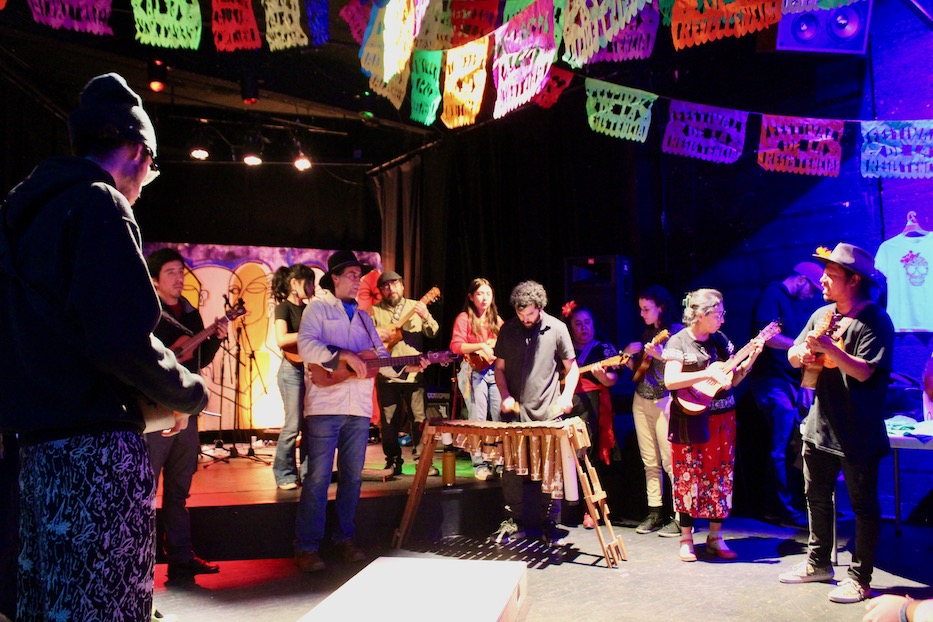
Bregamos Community Theater | Culture & Community | Fair Haven | Immigration | Arts & Culture | Semilla Collective
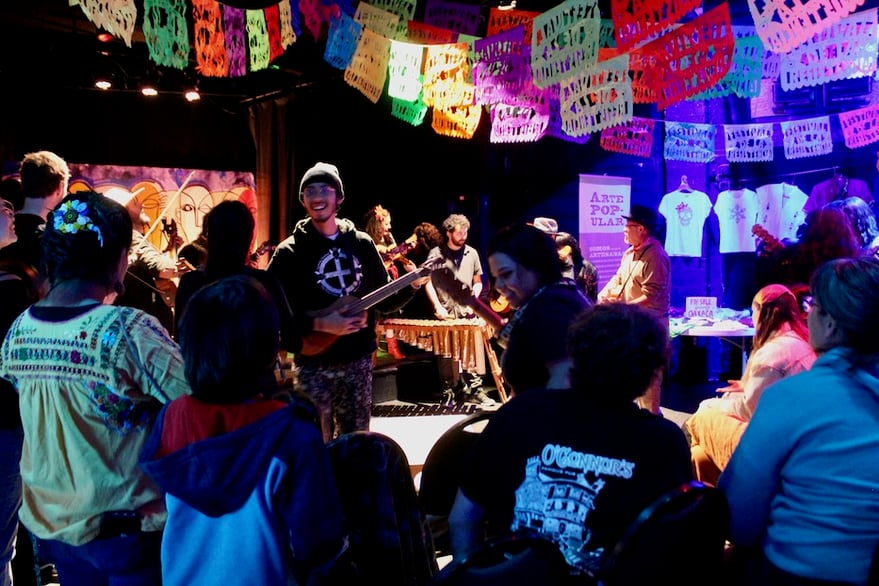
Members of the Tapacamino Colectivo include Fernando Guadarrama, Gregorio Quiros, Sinuhé Padilla-Isunza, Maria Puente, and Ik' Balam. Lucy Gellman Photos.
It was only one verse into “La Bamba” that the line of dancers formed spontaneously and began to weave through Bregamos Community Theater. To the words—Yo no soy marinero/Yo no soy marinero, soy capitán!—the line grew, some attendees raising their arms in the air. Close to the stage, musician Fernando Guadarrama didn’t miss a beat. As he played the jarana, he channeled a spirit that stretched from Veracruz to New Haven, impossible to listen to and stay still.
Those joyful sounds spilled out onto Blatchley Avenue Sunday night, as members of the Semilla Collective held their third annual “Festival de la Resistencia” (Festival of Resistance) at Bregamos Community Theater in the city’s Fair Haven neighborhood. Over eight hours, dozens gathered to celebrate resistance in many different forms, from Indigenous organizing and artmaking to Son Jarocho music that could have kept the room dancing for hours. By the end of the night, even the papel picado overhead seemed to be dancing.
“This is a space where we can bring together the movement to talk about why we resist, why we defend our land,” said Fatima Rojas, a longtime activist who for years has been one of the festival’s organizers. “This is a space where we can share resources, create awareness, build solidarity and build knowledge with each other.”
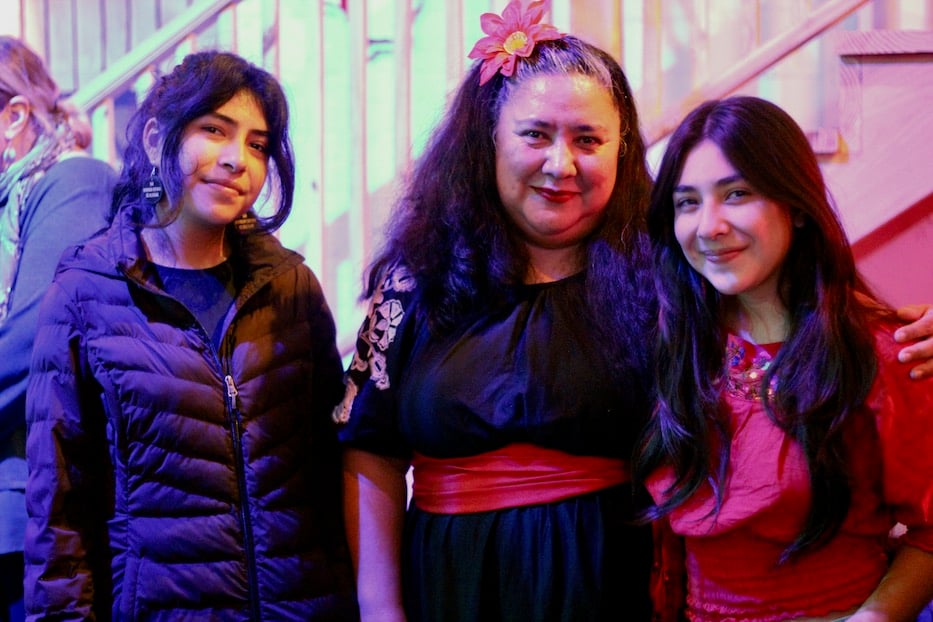
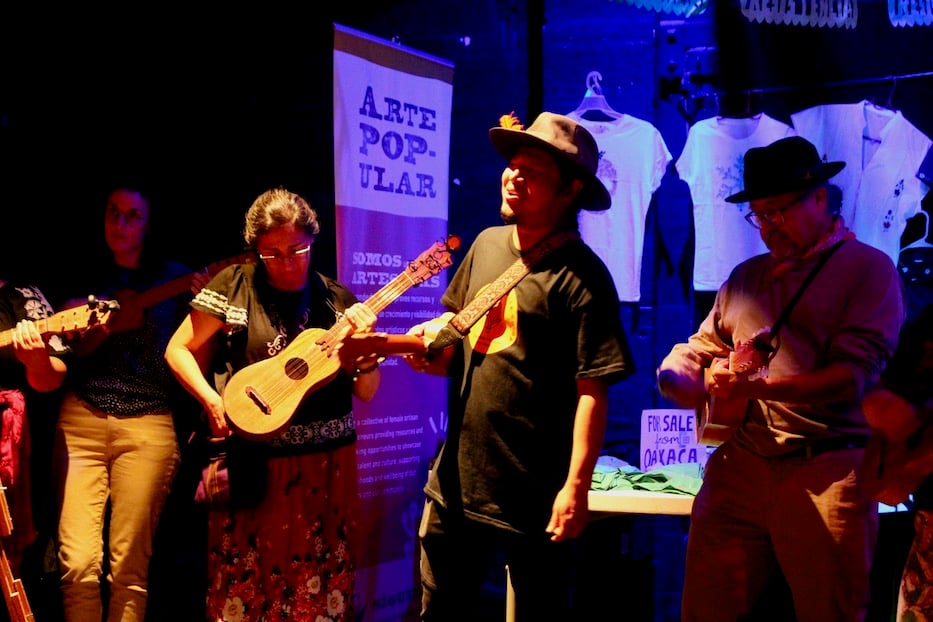
Top: Fatima Rojas (center) with her daughters Jade and Ambar. Bottom: Javirt Villatoro.
As an Indigenous woman herself—Rojas is Nahuas, from Puebla, Mexico—she added that she is proud to support grassroots economic development and the often-unacknowledged role of immigrant labor through the work that Semilla does. Around the theater, chefs and artisans from across the region gathered with warm, cheese-topped tlacoyos, nixtamalized corn flour, Guatemalan tamales and pupusas, braided pan dulce kissed with sesame seeds and cinnamon and at least three kinds of drinks made from fresh fruit.
Against a bright portrait of a bomba dancer, Tortillería Semilla’s Elizabeth Gonzalez and Anabel Hernandez showed off brand new black-and-gold t-shirts, taking donations to help the long-running culinary collective move into its next chapter. Born out of a belief in Indigenous foodways, the tortilleria uses nixtamalization – a pre-colonial, Mesoamericans process that entails boiling maize with wood ash or limestone – to turn out fresh tortillas each week.
This fall, Gonzalez said, the group finally has its long-awaited permits, and is selling both blue and white masa and fresh tortillas out of the Q House, where cooks are able to use its industrial-grade kitchen once a week, and do pickup and delivery on Thursday afternoons. For members of the collective, it’s a long-held culinary dream brought to fruition.
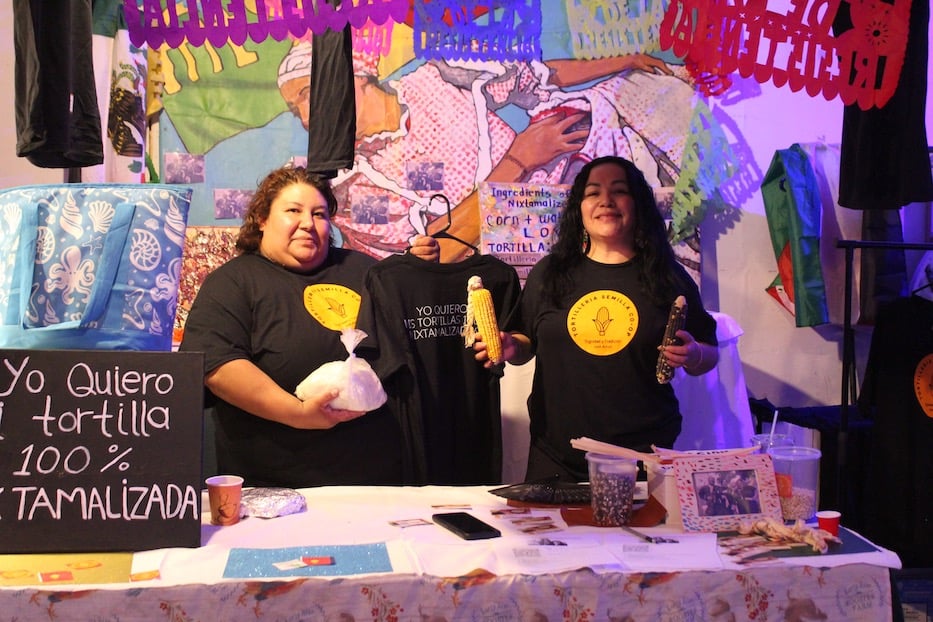
Elizabeth Gonzalez and Anabel Hernandez.
“We’re coming along, slowly but surely,” Gonzalez said as she watched her young daughter, Crystal, run around the theater with four-year-old Mailén Michtom-Segovia. “I’m very happy, very grateful to be here.”
At the other end of the room, Indigenous Mapuche artist Tarin Gonzalez greeted attendees at a table covered with delicate earrings, the designs catching in the light. On one end, a pair of fabric watermelon-slices dangled from their chrome hooks, turning the table into a statement of solidarity with Palestine. Nearby, a long strand of beads stood out in blue and red against the black tablecloth. Around them, patterns covered everything from immigration and borders to messages against colonialism.
Gonzalez, who was born to Chilean immigrants in the Bronx, said that jewelry making has become both a pastime and a form of self-expression. Fifteen years ago, she started to craft as a reprieve from her job running a food pantry, the stress of which she could feel even when she wasn’t at work. Initially, “I just needed to channel my energy,” she remembered. Then her mother pointed out how good she was at it.
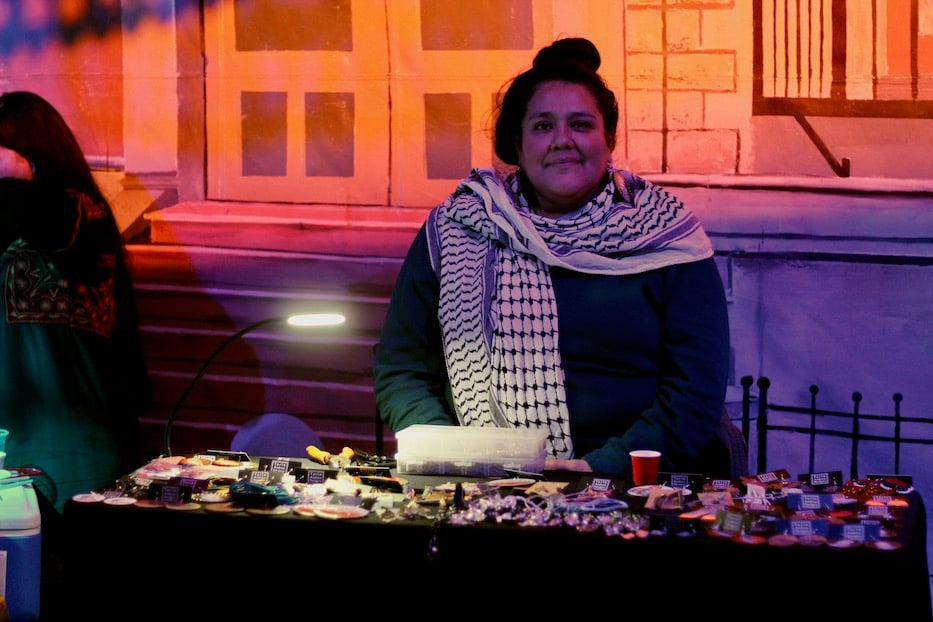
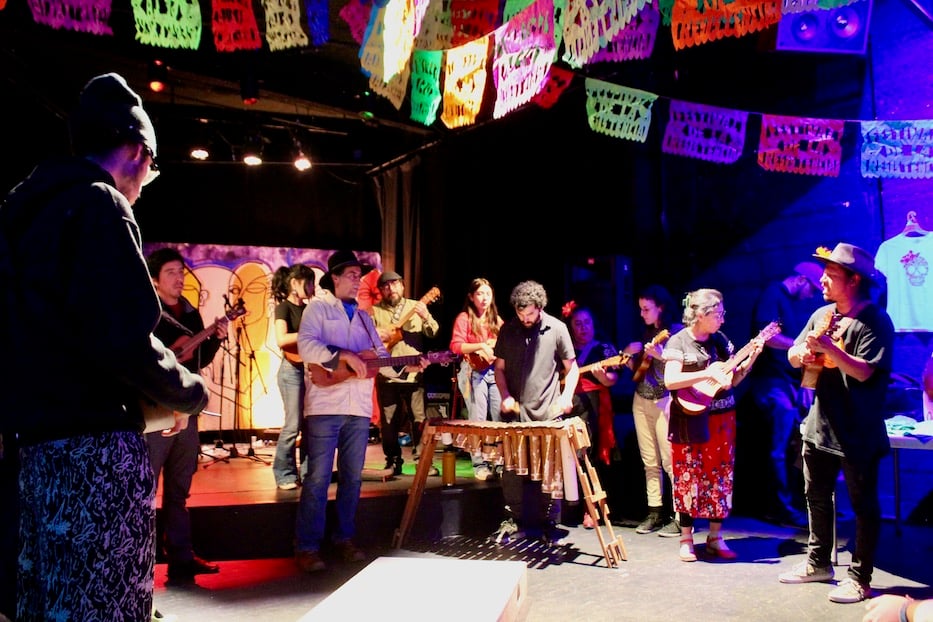
Top: Artist Tarin Gonzalez. Bottom: Members of the Tapacamino Colectivo during a community fandango that lasted for hours.
Over a decade later, it’s become a way to flex muscles as an artist and an activist. Earlier this month, she connected with the Semilla Collective in Washington, D.C., where a handful of members were marching alongside thousands and calling for a ceasefire in Palestine. For her, she said, events like Sunday’s festival are vital to remembering that joy and community are part of resistance.
“This is amazing!” she said. “Resistance is life! It’s love! It’s our existence. Because if we don’t struggle, our lands are gonna be decimated, and our people will be gone.”
Beside her, Cruz sold cups of just-tart-enough tepache, a Oaxacan beverage made from fermented pineapple rinds, panela, and cinnamon (variations also use fermented corn). As Cruz leaned over an orange-and-white cooler, she introduced the drink to passers-by, some of whom had never heard of it. Every so often, a chunk of conversation or bit of laughter bubbled up and drifted over knots of friends who had gathered with the golden, gem-colored beverage to catch up.
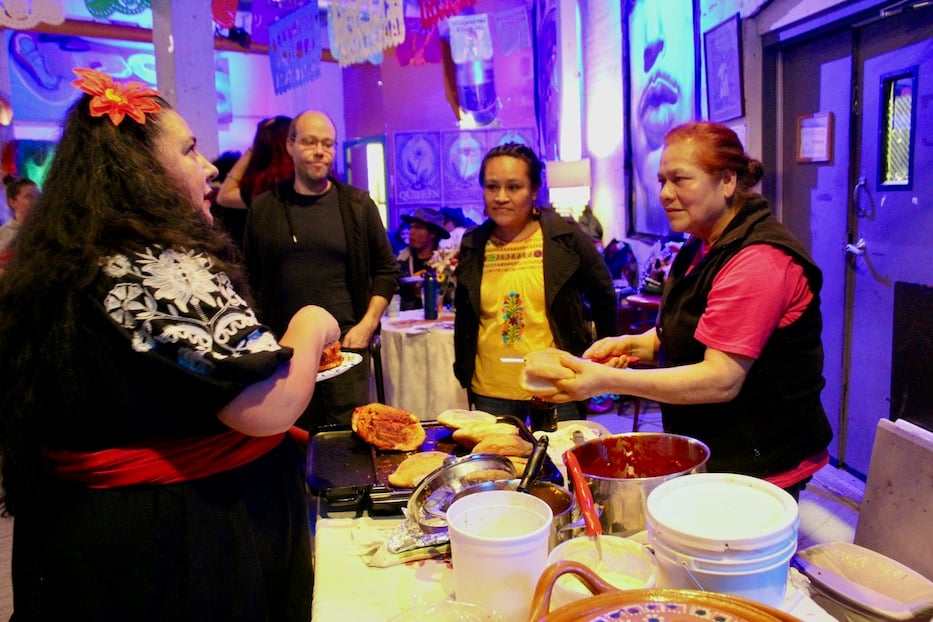
Martha Sanchez (in vest) with Rojas.
Across the theater, mother-son duo Martha Sanchez and Luis Morales served up warm pambazo sandwiches, spooning a thick, ruby-hued Guajillo pepper sauce, pork and potatoes, crema and salsa verde onto slices of thick, flour-dusted fresh bread. One table away, chef Maria Torres assembled her signature tlacoyos, thick corn tortillas topped with crumbled white cheese and finely chopped onion.
A self-described fan and member of the Semilla Collective, she said she’s missed making them for the community since closing Alegría Café at the end of last year. She and her husband, Saul Flores now run the North Haven-based business Venezia Pizza.
In the new business, “we are getting there little by little,” Torres said. “I feel excited to be here [tonight] because I’m happy to be a part of it.”
As attendees nibbled and sipped their way through the evening, Semilla members Eden Almasude, Azucena Minaya, and Javier Villatoro stepped onto the stage, all of them challenging attendees to think about the role of resistance and solidarity in their own lives. Minaya, who came to the U.S. from Peru when she was seven, took a deep breath before she spoke.
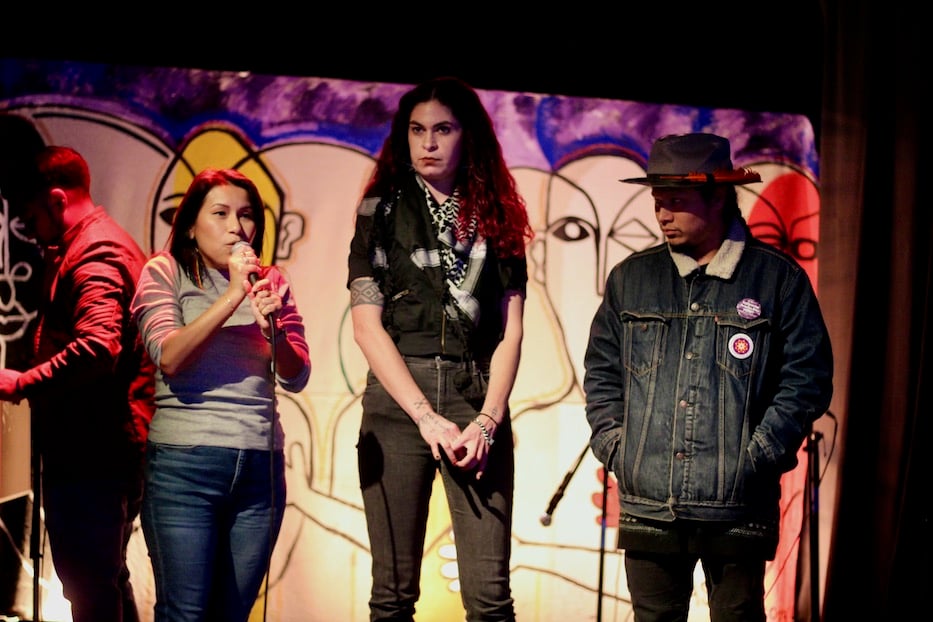
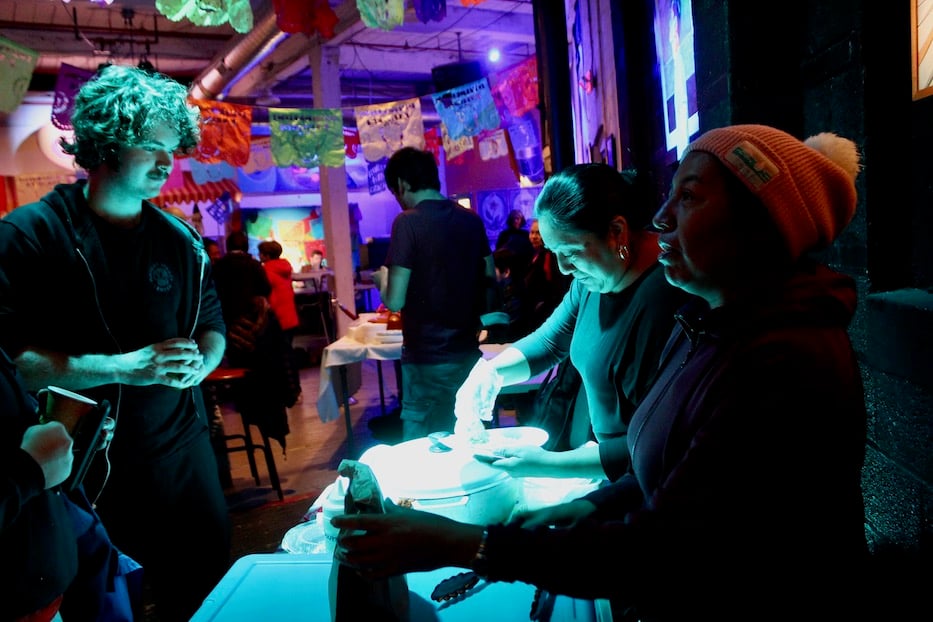
Azucena Minaya, Eden Almasude, and Javier Villatoro. Bottom: Maria Torres and Lorenza Paloma.
“Please be cognizant of the lands that you’re on,” she said, urging attendees to think beyond a language of land ownership (Fair Haven, where the theater is located, is on unceded Quinnipiac and Wappinger land). “Mention the lands that you’re on.”
“You owe back pay on land that you do not own,” added Almasude. Both she and Minaya later added that the land back movement is very near to their hearts: Minaya is Quechua, and Almasude is Amazighs, an Indigenous people of North Africa.
“Liberation and decolonization are the best medicine,” she said. “I believe as a human, it is my calling to fight for freedom because of my ancestors and the spirit of resistance that they have passed down.”
As if their words were a benediction, they opened the space to members of Tapacamino Colectivo, many of whom come from Mexico specifically for the festival each year. At the center of the group, son jarocho maven Fernando Guadarrama began to play. As the sound of “La Guacamaya” rose through the theater, attendees began to dance, some coming in closer to study an intimate and immediately danceable son jarocho orchestra.
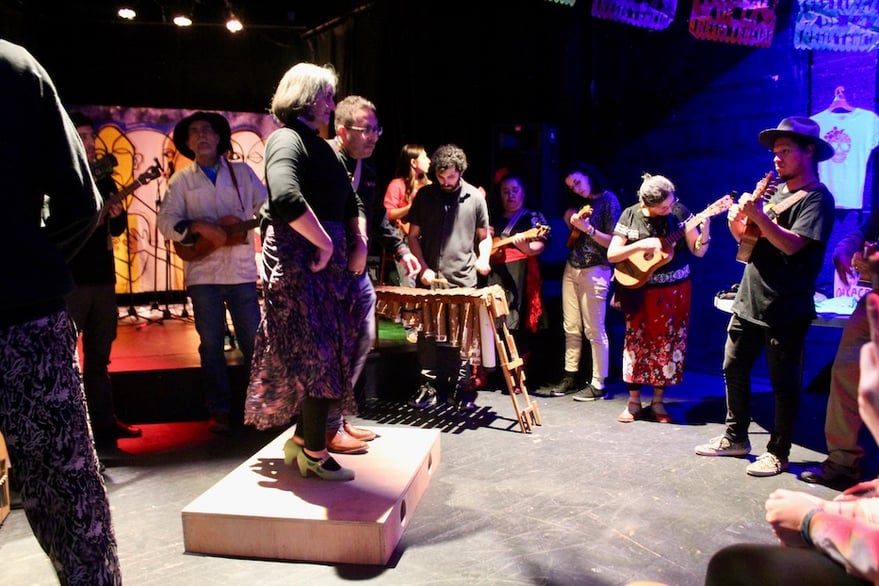
In the art form, musicians blend the guitar-like sound of requinto and jarana with marimba, a jawbone called a quijada, and steady footfalls that land on a tarima, or raised wooden board. As Maria Puente Flores began to move in time with the music, conversations stilled and fell to a hush, attendees pulled toward the sound with a nearly umbilical force.
It was the start to an evening of music that often felt as if it could have gone all night. No sooner had members of Tapacamino Colectivo stepped down from the stage for a moment than Semilla’s in-house musicians crowded onto the stage, sharing the mics that were available to them. Clearing her throat, Rojas introduced the group as Son Chaneques Rebeldes, so named after the eponymous Náhuatl word for a guardian of nature.
Over the past two weeks, many have gathered to write an original song about borders and migration, foregrounding their mission of resistance in every line and lyric. As Guadarrama joined the ensemble onstage, members looked down at the songsheets in their hands, and began to sway to the melody. Suddenly, they were building bridges that transcended man-made borders, pushing back against centuries of white supremacy and colonialism. (Read the full song here). They sang:
Mil razones me trajeron/Por este camino incierto
Con sufrimiento y dolor/Camine sobre mis muertos
Y el rezo de mi familiia/Me acompaño en el deserto
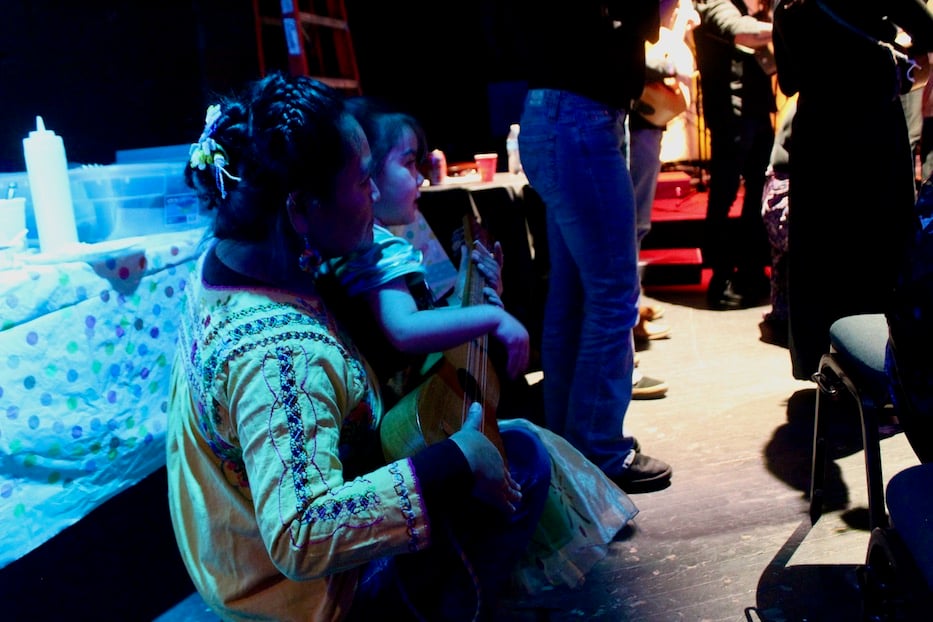
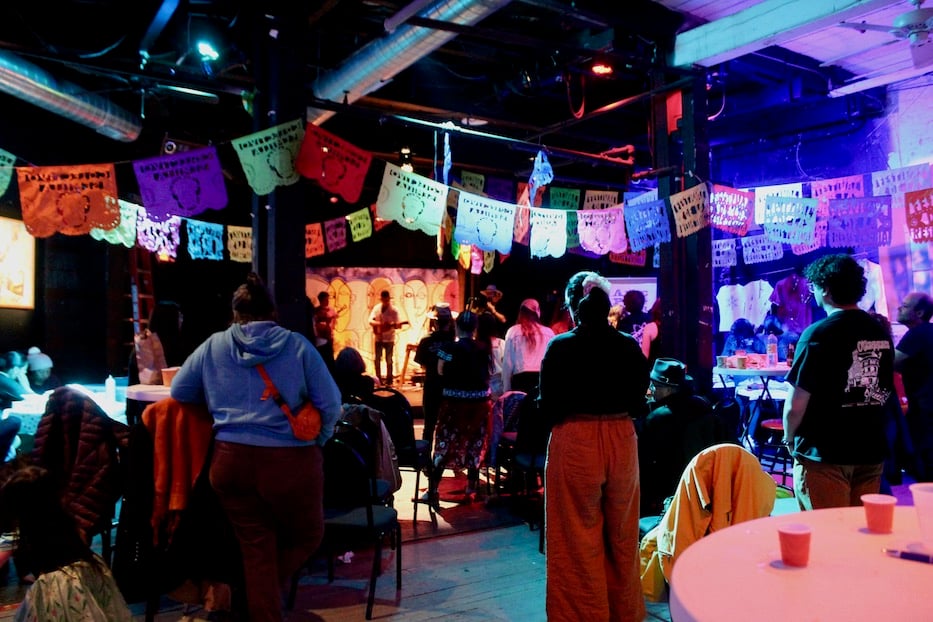
As they continued to sing—Dame un abrazo/Porque me voy/Quiero llevar—it seemed that every ear in the room was turned toward the stage. As individual members took on lines and whole verses as their own, they together told a story of the agony and exhaustion that it can take to cross from one country into another, discriminated against because of their heritage and the borders they have ostensibly trespassed. At the lip of the stage, Crystal and Mailén danced along, ushering the song into the future.
Y aunque llegué a este pais/Llena de arena y espinas
Traje en los pies mi raiz/Soy cultura que camina
Como planta de maiz/Que en cualquier tierra germina
Impromptu vocalist Mariecruz Hernandez, who now runs Mazorca Mexican Cuisine with her two brothers in Hamden, praised the event as she came down from the stage, and prepared to stick around for the fandango. Born in Queens to Mexican immigrants, Hernandez moved to Hamden two years ago, when she and her brothers opened the restaurant on Dixwell Avenue.
Last year, she connected with members of the Semilla Collective when she found herself at Bregamos, celebrating resistance that has since become tradition. Before joining a fandango that built a mellifluous bridge from New Haven to Oaxaca, she praised the group for welcoming her with open arms.
“It feels like I belong here,” she said, motioning to a station she’d set up with tortillas and free lime and hibiscus aguas frescas. “These are my new best friends.”
Watch more from the festival above or at the Arts Council of Greater New Haven's Instagram or Facebook.

